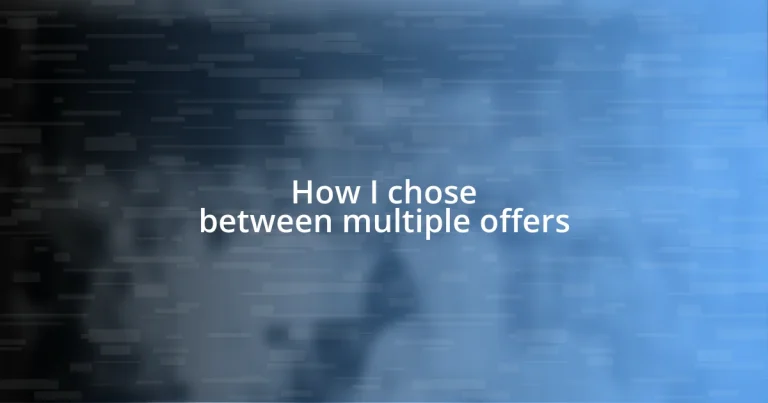Key takeaways:
- Conducting a thorough analysis of the job market and industry trends to understand personal skill alignment significantly informed decision-making.
- Evaluating career goals and workplace culture helped clarify long-term aspirations and ensured a good fit with personal values.
- Reflecting on offers through a pros and cons list and considering the overall impact of salary and benefits guided a more informed, values-based choice.
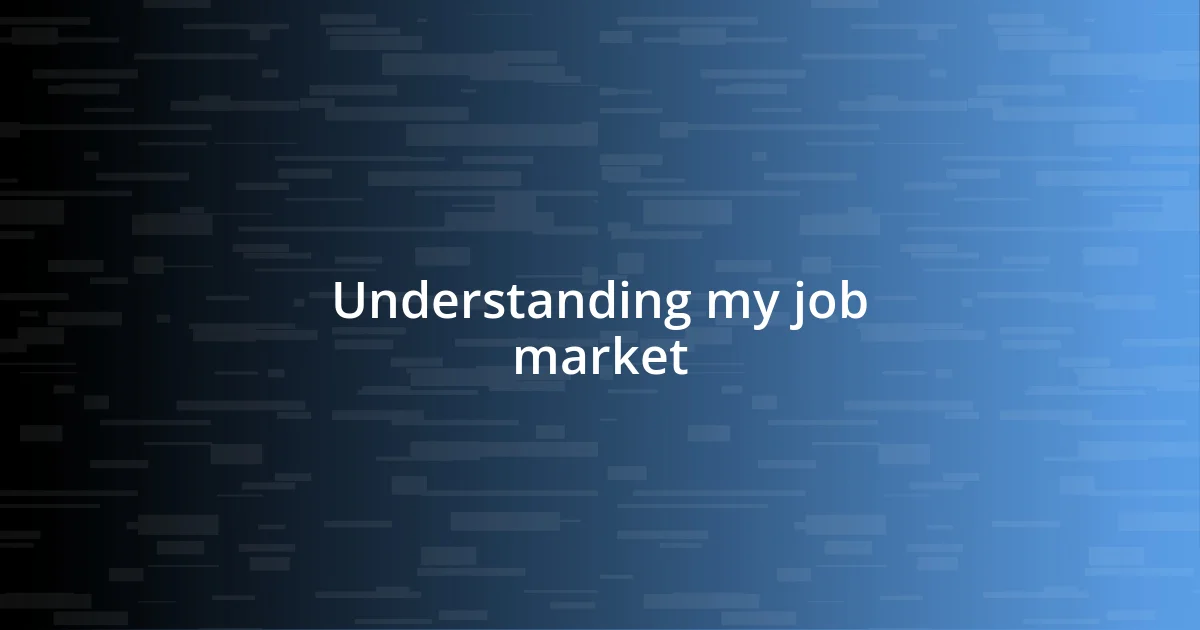
Understanding my job market
Understanding my job market was a pivotal moment in my decision-making process. I remember the confusion I felt when I first glanced at job openings—so many roles, each with its own requirements. I found myself asking, “What do I really want?” That question was the starting point for a deeper dive into my options.
As I started to analyze the industry trends, I noticed a significant demand for skills that I possessed. It struck me just how much my background in data analysis could set me apart in this competitive landscape. Reflecting on my experiences, I felt a sense of empowerment; knowledge is a powerful tool that can ease the pressure of decision-making.
Moreover, I engaged with professionals in my field, tapping into their insights about company cultures and growth opportunities. Listening to their stories about what drew them to their current positions helped me envision my own path. Isn’t it fascinating how personal connections can illuminate aspects of the job market that raw data simply can’t reveal?
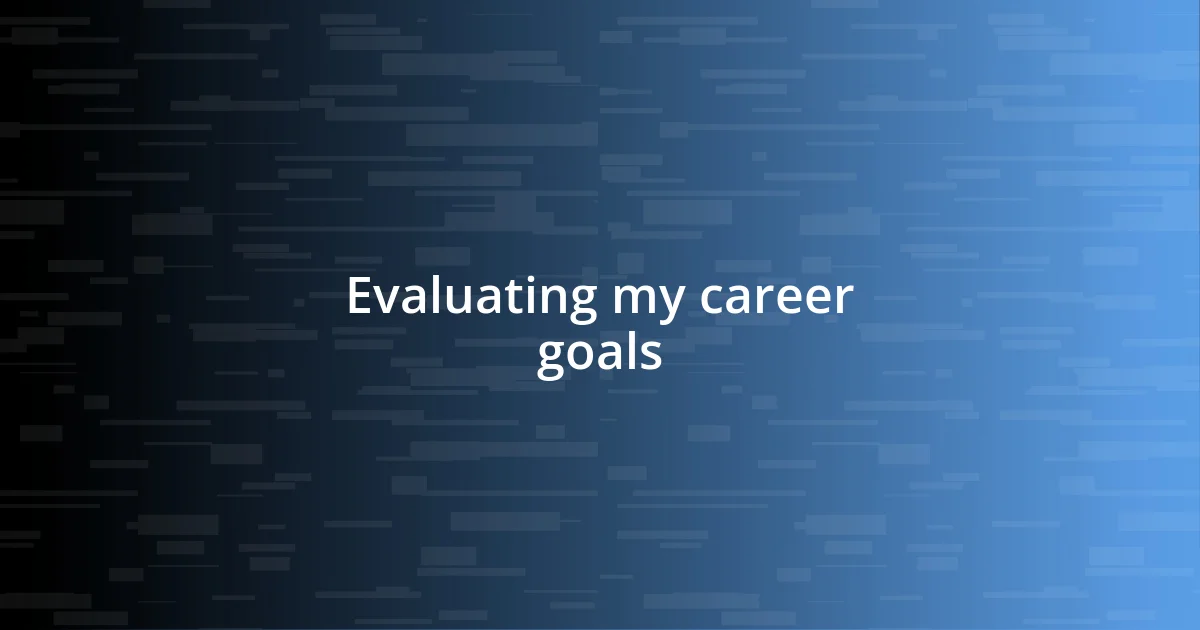
Evaluating my career goals
Evaluating my career goals
Evaluating my career goals was essential in determining which offers aligned with my aspirations. I vividly recall sitting in my favorite coffee shop, sipping a latte, and jotting down what I truly wanted from my career. This exercise helped clarify not just my immediate desires but also my long-term visions. I started considering factors such as work-life balance, opportunities for advancement, and the type of projects that excite me.
Reflecting on these elements allowed me to see where I wanted to be in five or ten years, and those images shaped my decision-making process. I realized I needed roles that would not only challenge me but also foster growth in my skill set, ensuring my career trajectory remained upward. In that moment, I felt a sense of purpose, as if I was finally taking charge of my future.
- Identified personal values and true passions
- Prioritized long-term career aspirations over immediate rewards
- Evaluated potential for skill growth and professional development
- Considered workplace culture and alignment with my own ideals
- Acknowledged the importance of work-life balance in my happiness
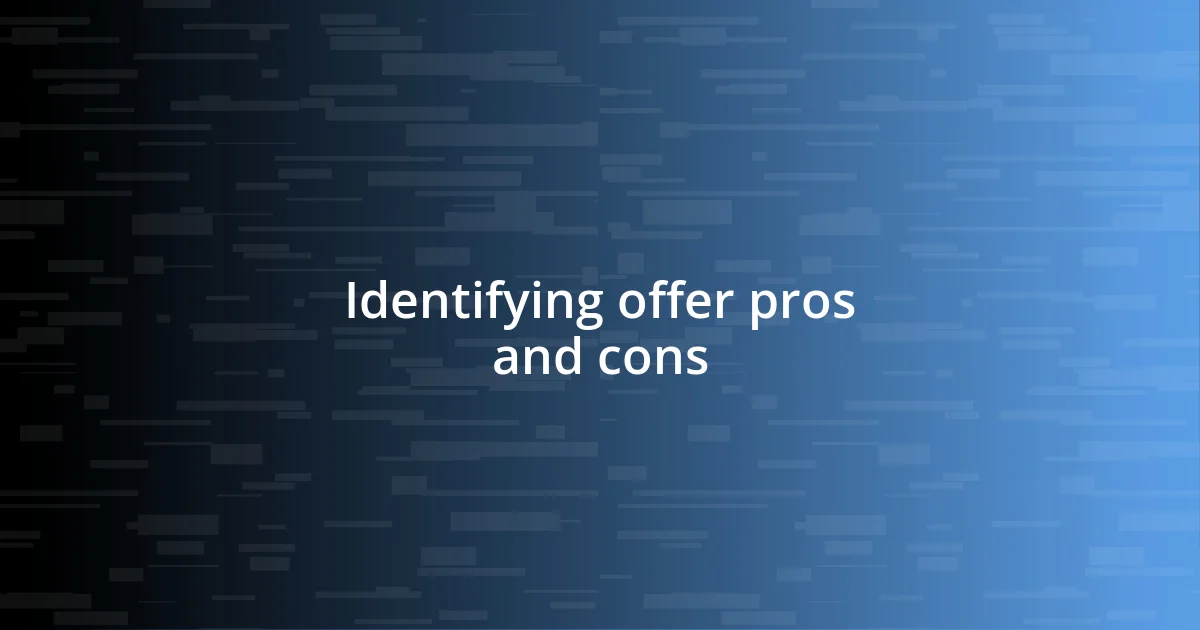
Identifying offer pros and cons
Identifying the pros and cons of each job offer felt like a critical step in my journey. I found it helpful to create a side-by-side comparison to visualize everything clearly. By considering aspects like salary, benefits, and company culture, I could see which areas truly mattered to me. For instance, one offer promised a higher salary but had limited growth opportunities, while another came with fantastic mentorship but a lower pay scale. Weighing these elements became an enlightening exercise that revealed my priorities.
In my experience, I also realized that some pros aren’t as straightforward as they seem. A role with lots of remote work sounded perfect initially, yet I worried about feeling isolated from my team. On the other hand, a position with strict office hours offered the camaraderie I often craved, but what about flexibility? Each offer had its unique challenges, and understanding these nuances built a clearer picture for me.
Ultimately, creating this pros and cons list allowed me to articulate my feelings about each option. I found myself asking questions like, “Will this job make me happier?” or “Am I willing to give up flexibility for collaboration?” The more I reflected, the more confident I felt in making my choice.
| Offer A | Offer B |
|---|---|
| Higher Salary | Strong Mentorship |
| Limited Growth | Great Work Culture |
| Remote Work | Office Hours |
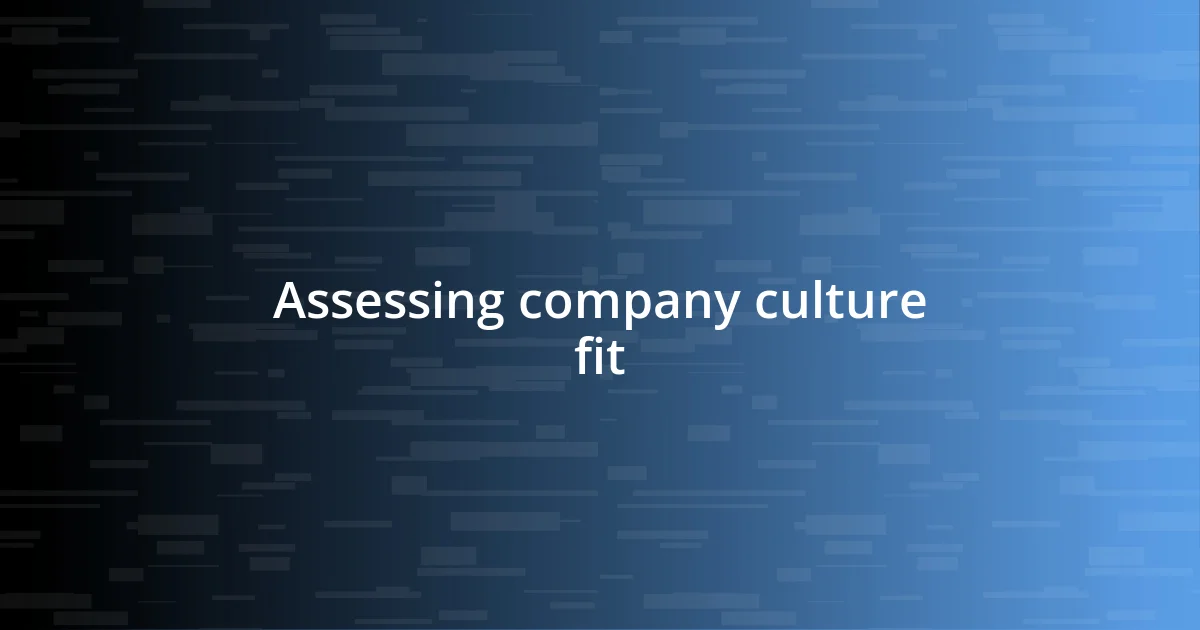
Assessing company culture fit
Understanding how a company’s culture resonates with your own values is fundamental to making a decision that you can feel good about. I remember visiting a potential employer’s office and feeling a palpable energy in the air. The team’s laughter and collaboration were infectious, giving me the sense that this is a place where people genuinely enjoy working together. Don’t you think that feeling a sense of community could significantly enhance your work experience?
The more I delved into assessing culture fit, the more I realized that it wasn’t just about perks like free snacks or a game room. It was about shared values and an environment that nurtured my passions. At one interview, a leader spoke about the importance of continuous learning, and it struck a chord with me. I often seek environments where curiosity is celebrated. Have you ever found yourself inspired by a conversation that highlighted what truly matters in the workplace?
As I explored these cultural aspects further, it became clear to me that aligning with a company’s ethos and mission was crucial for my job satisfaction. I noted how employees interacted, the diversity of opinions, and a sense of belonging. These are vital indicators of whether I could thrive in that environment. For instance, one company emphasized work-life balance, and I could see how passionate their team was about maintaining it. It made me reflect: would I be able to bring my best self to work every day in an environment that supports my personal well-being? It was this introspection that solidified my understanding of company culture’s significance in my decision-making process.
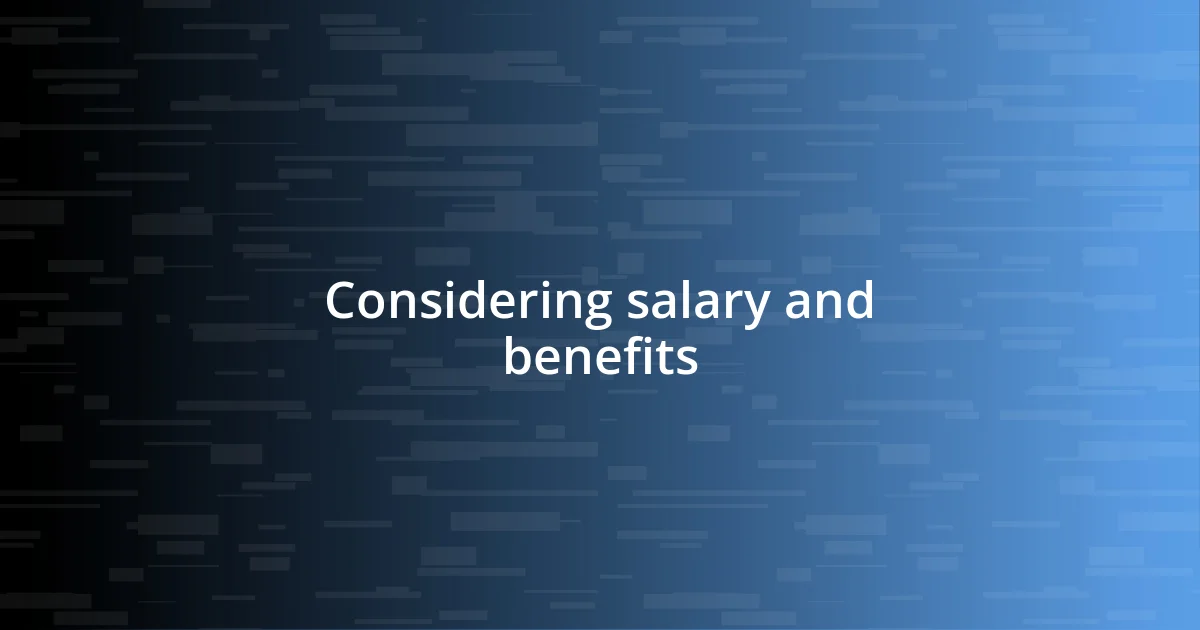
Considering salary and benefits
When I was weighing my job offers, salary played a significant role in my thought process. I remember looking at one offer that boasted a hefty paycheck but at a company known for burnout. It made me wonder, “Is money worth sacrificing my well-being?” I took a step back to consider not just the numbers but the long-term impact on my lifestyle and happiness.
Benefits added another layer to my decision. One offer offered standard health coverage, but another included generous paid time off and wellness programs. I recall a friend sharing how a flexible benefits package enabled her to prioritize family time. This insight struck me and led me to question, “What kind of life do I want outside of work?” Diving deeper into benefits helped me envision how each option aligned with my personal priorities.
Ultimately, considering salary and benefits wasn’t just a financial exercise; it became a reflection of my values and aspirations. I learned that sometimes a lower salary combined with robust benefits could lead to greater job satisfaction in the long run. Have you ever thought about how benefits might influence your overall happiness in a role? For me, it transformed my approach to job offers entirely, ensuring I wouldn’t just settle for a high paycheck but would also pursue a holistic, fulfilling career.
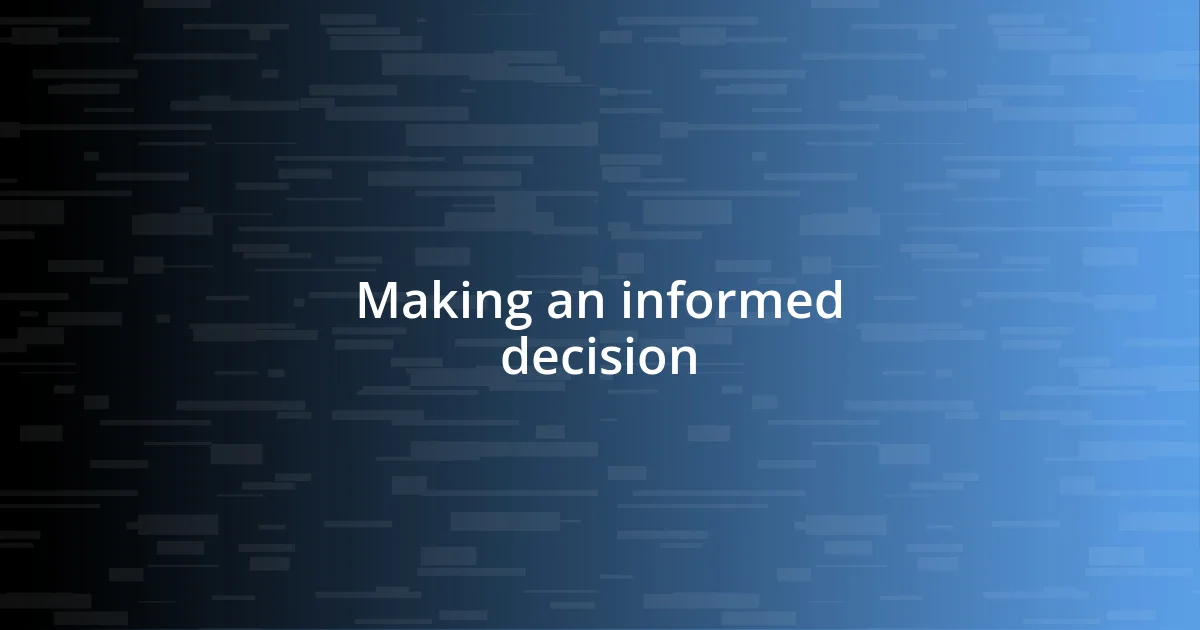
Making an informed decision
Making an informed decision requires looking beyond the surface of job offers. I distinctly remember sitting down with a pros and cons list, trying to make sense of each opportunity. With so many factors to consider, I realized that I had to prioritize what truly mattered to me, such as my career goals and personal values. Have you ever found clarity from just putting your thoughts on paper?
As I navigated through the offers, I found it essential to seek advice from mentors and friends. One evening, over coffee, a mentor shared her perspective on the importance of passion and purpose in work. It hit me that aligning my career path with what excites me was non-negotiable. How often do we let outside opinions shape our choices instead of listening to our own internal compass?
In the end, gathering information and reflecting on my experiences shaped my choices. I began to understand that an informed decision isn’t just about gathering facts but also about trusting my instincts. I recall a moment when, during a particularly enlightening conversation with a former colleague, I realized that my happiness would ultimately stem from working in a place where I could grow and contribute meaningfully. That thought alone guided me toward a decision that felt right deep down. Have you ever felt that sense of assurance when you make the right choice for yourself?
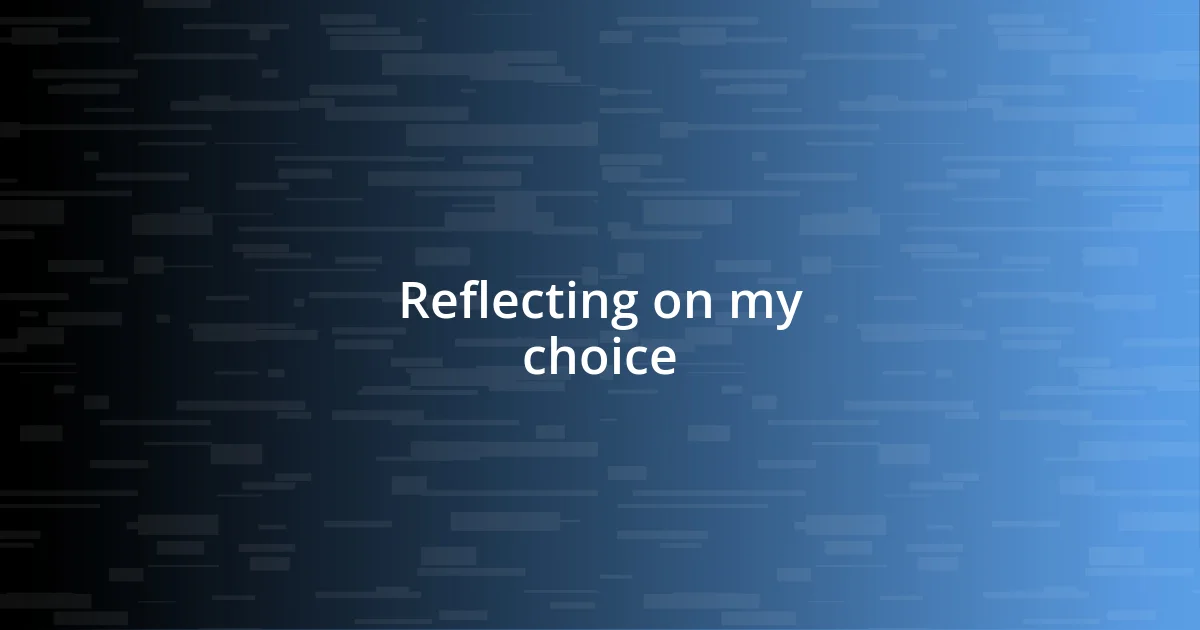
Reflecting on my choice
Reflecting on my choice was, in many ways, an emotional journey. I found myself revisiting moments from my past roles, recalling what I loved and what drained me. It struck me how crucial it is to align a new job not just with my immediate needs but also with my long-term happiness. Has anyone else felt the tug of nostalgia when weighing new opportunities?
As I sat with my thoughts, I realized the importance of envisioning my future. I could feel the weight of each decision, wondering which path would lead to fulfillment and growth. I recalled a time when I rushed into a position without considering my personal vision, ending up feeling lost and unmotivated. The tension between fear of missing out and the desire for a meaningful career became palpable. Have you ever experienced a similar conflict in career choices?
Eventually, the reflection led me to trust my intuition more. I distinctly remember a moment during a quiet evening, looking over the offers when one stood out not just for its perks but for the alignment with my values. It felt reassuring, like a whisper saying, “This is right for you.” This clarity ushered in a wave of relief, reminding me that sometimes the best choice comes when you listen to your heart. How often do we allow ourselves that luxury when making significant decisions?












